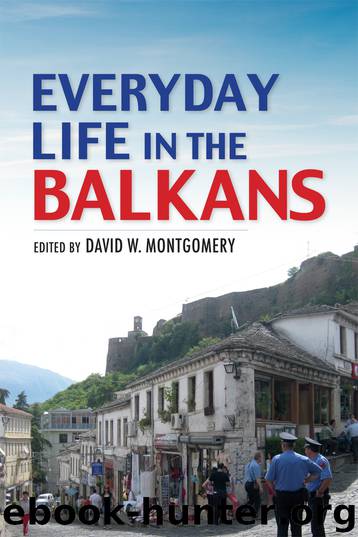Everyday Life in the Balkans by David W. Montgomery

Author:David W. Montgomery
Language: eng
Format: epub
ISBN: 9780253038197
Publisher: Indiana University Press
Published: 2018-11-07T16:00:00+00:00
19Neither the Balkans nor Europe: The “Where” and “When” in Present-Day Albania
Nataša Gregorič Bon
On a hot afternoon in mid-July, I was sitting in a café called Britania in the Albanian coastal city of Vlora. I entered into a conversation with Bledi, a man who seemed to be in his forties and was sitting at the next table with his sister-in-law and two nieces. Some minutes into our conversation, he became curious about where I was from.1 My telling him I was from Slovenia elicited his comment: “Oh, then we are all from the same area: the Balkans.” Not long after he succinctly added: “Though we [the Albanians] are in fact Illyrians.” Bledi further explained that Albanians are descendants of Illyrians, which he claimed to be one of the oldest populations in Europe. This kind of explanation can be heard from any number of Albanians when they try to explain their identity and emplace themselves on the historical, geopolitical, and social map of Europe and the world.
The hypothesis of Albanians originating from Illyrians was promoted in the period of the communist regime when its autocratic leader at the time, Enver Hoxha, turned it into an official historical fact. With this he promulgated the idea of Albanians as “the first civilization” in Europe who have “always” lived in the present state territory, thus glossing over any differences existing between the ancient past and the present. Despite the fact that over two decades have passed since the collapse of the regime in 1991, this idea still has currency and remains part of the Albanian school curriculum.
The communist regime in Albania was arguably one of the most consistently Stalinist regimes in Europe. Political and economic centralization and draconian restrictions imposed on movement (for example, the ban on private cars and any cross-border transportation), including on imports and exports, as well as foreign political partnerships with western European countries—these factors profoundly influenced peoples’ perception of their location on the geopolitical map. Many people can still recall how they were absolutely convinced that Albania was one of the most beautiful and prosperous countries in the world, located at its very center. Only in the course of the last years of the communist regime, following Hoxha’s death (in 1985) and during the succession of Ramiz Alia (who soon lost power and control over the country), did people start to realize that many countries were in fact economically, politically, and financially much better off than Albania.
Compared to the ex-Yugoslav countries, the meaning of the phrase “the Balkans” (and the phrase itself) appeared relatively late in the Albanian discourse. After the fall of communism, which was largely brought about by the country’s economic and political crisis, a lot of nonprofit, governmental, and nongovernmental international organizations from the United States and western Europe flooded the Albanian public space. It was then that many Albanians became aware that Albania was one of the poorest and least developed countries in Europe. Consequently, the phrase “the Balkans” was never fully adopted in everyday parlance, although it was a phrase often used in Europe and America.
Download
This site does not store any files on its server. We only index and link to content provided by other sites. Please contact the content providers to delete copyright contents if any and email us, we'll remove relevant links or contents immediately.
| Arms Control | Diplomacy |
| Security | Trades & Tariffs |
| Treaties | African |
| Asian | Australian & Oceanian |
| Canadian | Caribbean & Latin American |
| European | Middle Eastern |
| Russian & Former Soviet Union |
The Secret History by Donna Tartt(19032)
The Social Justice Warrior Handbook by Lisa De Pasquale(12182)
Thirteen Reasons Why by Jay Asher(8884)
This Is How You Lose Her by Junot Diaz(6872)
Weapons of Math Destruction by Cathy O'Neil(6261)
Zero to One by Peter Thiel(5782)
Beartown by Fredrik Backman(5734)
The Myth of the Strong Leader by Archie Brown(5491)
The Fire Next Time by James Baldwin(5424)
How Democracies Die by Steven Levitsky & Daniel Ziblatt(5211)
Promise Me, Dad by Joe Biden(5141)
Stone's Rules by Roger Stone(5079)
A Higher Loyalty: Truth, Lies, and Leadership by James Comey(4946)
100 Deadly Skills by Clint Emerson(4911)
Rise and Kill First by Ronen Bergman(4776)
Secrecy World by Jake Bernstein(4738)
The David Icke Guide to the Global Conspiracy (and how to end it) by David Icke(4697)
The Farm by Tom Rob Smith(4500)
The Doomsday Machine by Daniel Ellsberg(4481)
